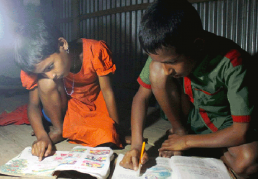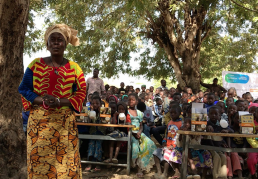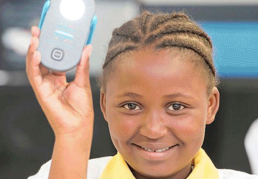Record results at Friendship's schools in Bangladesh
The NGO Friendship has been helping Bangladesh’s most disadvantaged communities since 2002. Most live on ‘chars’, ephemeral islands in the Brahmaputra River that disappear during floods, leaving local people in conditions of extreme hardship. This article profiles Friendship and its wide-ranging work to support the people of Bangladesh, in particular its educational access programme which is delivering results far beyond expectations.
Friendship’s comprehensive system of support
Founded by Runa Khan, a leading figure in Bangladesh and a long-standing partner of the ENGIE Foundation, Friendship works to empower people in need in the most remote parts of the country through a sustainable and integrated approach to development.
In 2002, the NGO dispatched its first hospital ship to bring medical care to the inhabitants of the Brahmaputra river islands. Nowadays, some 250,000 people a month are treated by this health programme. It also delivers emergency relief when required, providing basic necessities as well as raising awareness about natural disasters. In addition, Friendship is committed to preserving the culture heritage of the communities it serves, and works to promote access to energy. Since 2011, 500 microgrids powered by solar panels have been installed with the support of the ENGIE Foundation. This year, the number is expected to reach 4,000, providing over 20,000 people with sustainable, locally-generated energy.
Promoting access to education
Since 2015, thanks to the support of the ENGIE Foundation and volunteers from Energy Assistance France, Friendship has been implementing a comprehensive plan to boost literacy by building schools and adult education centres. The aim is to make the schools sustainable by installing photovoltaic panels, mobile so that they can be easily dismantled and moved in the event of a natural disaster, and fun (courtesy of video lessons, a portable school library, gardening and biodiversity awareness lessons, and so on).
This innovative model is proving successful as all 56 students who completed their three years of lower secondary education in the schools launched by Friendship in 2015 were awarded their school certificate! This compares with a nationwide pass rate of 83%. Bangladesh’s Information and Communication Technology Minister Zunaid Ahmed Palak has congratulated Friendship and is keen to see more schools built in the near future.
Empowering 2,000 young people in Burkina Faso
In developing countries, and particularly in Africa, access to energy is a top priority. The ENGIE Foundation and the H.R.H. Princess Abze Djigma Foundation have decided to join forces to promote access to sustainable and affordable energy for people living in rural areas in the Centre-Sud region of Burkina Faso. Read on to find out more.
The H.R.H. Princess Abze Djigma Foundation
Currently, 1.1 billion people have no access to electricity while around 1.5 billion have only limited access (source: World Bank Group 2017). In Africa, two thirds of the continent’s population, some 650 million people, are without access to power. With Africa’s population set to increase by 1 billion within the next 30 years, this poses an enormous challenge. In some rural areas of Burkina Faso, less than 3% of households are connected to the power grid, forcing local people to resort to dangerous and inefficient fuels for lighting and other everyday needs.
Set up by Her Royal Highness Princess Abze Djigma, the H.R.H. Princess Abze Djigma Foundation is a non-profit organisation dedicated to supporting access to affordable and sustainable energy for people in developing countries. It also aims to reduce poverty by providing and deploying energy and biodiversity solutions for women and young people:
– Supply and installation of solar panels
– Training in the installation, use and maintenance of solar generation solutions
– Irrigation systems to increase local agricultural productivity
– Provision of a platform to stimulate entrepreneurship.
MAMA-LIGHT® and the ENGIE Foundation in Burkina Faso
The ENGIE Foundation has joined forces with the H.R.H. Princess Abze Djigma Foundation to support its MAMA-LIGHT® initiative. The initiative provides access to affordable and sustainable energy sources for women, small businesses, children and disadvantaged young people around the globe. Selected by the United Nations at the Solutions Summit at the UN General Assembly in 2015, the programme also drives the generation of new jobs and creates a sound basis for gender equality and women’s empowerment.
The partnership signed between the ENGIE Foundation and the H.R.H. Princess Abze Djigma Foundation on December 18 will provide 2,000 schoolchildren and students from the Centre-Sud region of Burkina Faso (1,000 girls and 1,000 boys) with a MAMA-LIGHT® portable solar lamp.
Schools, Lights and Rights: an encouraging second year
Launched as part of COP21 in 2015, the Schools, Lights and Rights pilot programme is one of the ENGIE Foundation’s flagship initiatives. Its strength lies in a) its ambition of promoting education, access to energy and the social inclusion of disadvantaged groups, b) the involvement of partner organisations and volunteer employees from the ENGIE Group over at least a three-year period, and c) the results it has achieved during the first two years of the programme. Read on to find out more.
Schools, lights and rights for the children of Africa
Through the Schools, Lights and Rights project, the ENGIE Foundation and the federation of charities La Voix De l’Enfant (The Voice of the Child) have been creating brighter futures for children in need around the world since 2015. This ambitious three-year programme spanning seven countries (South Africa, Burkina Faso, Morocco, Madagascar, Afghanistan, India and France) seeks to promote education (Schools), access to energy (Lights) and the social inclusion of children (Rights).
In its first year, more than 5,000 civil statuses were issued to children. In addition, 5,000 portable solar lamps were distributed. Paid for by the ENGIE Foundation, these lights facilitate access to education by allowing children to work at home in the evening. They also promote health and safety by reducing the risks associated with using candles and oil lamps. The programme also supported the green electrification of schools by solar panels, thanks to the courage and dedication of volunteers from Energy Assistance France (an NGO made up of ENGIE Group employees). Last but not least, volunteers worked with local communities to raise awareness of renewable energies, environmental protection and sustainable development – a reminder that the future of these communities and the future of our planet are interlinked.
Schools, Lights and Rights: an encouraging second year
The second year began with the aim of expanding and strengthening the programme, helped by support from local organisations and partners in two new countries: Cameroon and the Democratic Republic of the Congo. La Voix De l’Enfant member associations, with backing from the ENGIE Foundation, were able to strengthen the support mechanisms for local communities: more than 57,000 civil statuses were obtained, over 8,600 portable solar lamps distributed and many schools and childcare centres provided with solar power. In addition, seven electrification projects are currently being completed by La Voix De l’Enfant associations and volunteers from Energy Assistance France. Though a modest contribution to the fight against global energy poverty, this programme offers great potential to develop social and environmental initiatives that benefit children.
The smiles on the children’s faces are the greatest reward, but the ENGIE Foundation wishes to thank the member associations of La Voix De l’Enfant and their partners who contribute every day to improving the living conditions of people enduring energy poverty and social exclusion. They are: Valued Citizens (South Africa), Afghanistan Libre (Afghanistan), SOS Enfants, Enfants & Développement (Burkina Faso), AED Karen Mane (Morocco), Bazar Sans Frontières and Maison de Sagesse (Madagascar), Volontariat (India) and Intermèdes Robinson (France).





